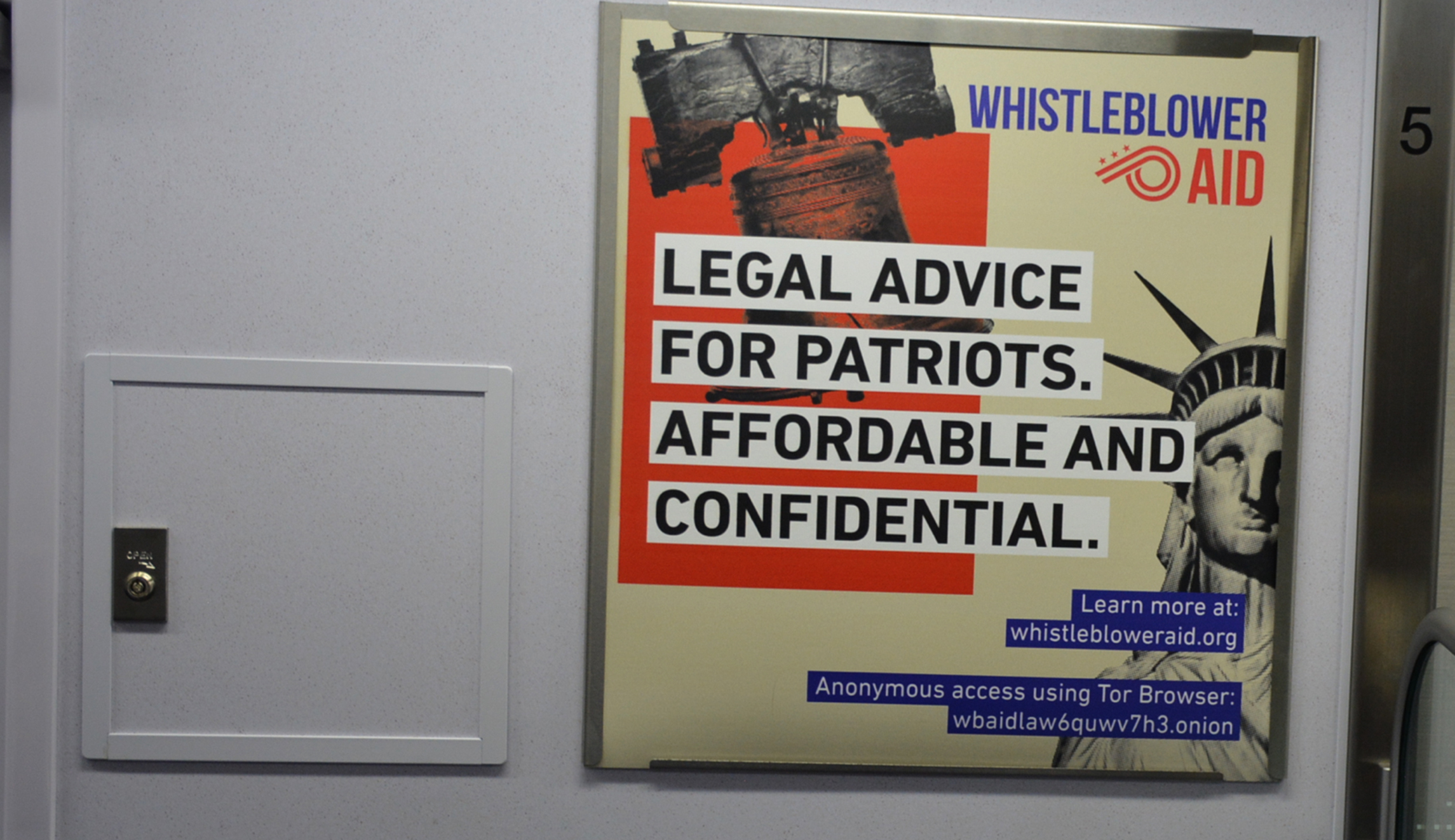A new organization aspires to help whistleblowers not only with free legal advice, but also with media coaching, therapy to address stress, and rent and mortgage payments if they get fired for going to the press.
The group, Whistleblower Aid, debuted Monday with an ad blitz plastering D.C. Metro trains and with mobile billboards circling the White House, along with the CIA and NSA headquarters.
With more than $100,000 raised and ambitious plans to reach $1 million, the effort comes amid a year of high-profile leaks from within the Trump administration.

Whistleblower Aid is led by defense attorney Mark Zaid and onetime client John Tye, a former State Department internet freedom expert who went public in 2014 to warn massive surveillance can happen without judicial or legislative review under Executive Order 12333.
Zaid and Tye told the Washington Examiner the effort has about 10 staff members now, but Tye says the other participants aren’t being identified to keep security vulnerabilities to a minimum.
“It’s quite scary to be a whistleblower,” Tye said. “We’re trying to attract people who see something wrong and want to do something about it and not go to prison.”
All whistleblower contacts must be made using the anonymizing Tor browser via a designated .onion hidden website, a security measure the founders hope will build trust with potential sources.
Whistleblower Aid will not facilitate the criminal leaking of classified material, but will help submit statements for pre-publication review and file lawsuits if permission is not granted to publicly describe classified content, Tye said.
For unclassified information, the group will help would-be whistleblowers understand their legal options, including internal avenues to executive or legislative watchdogs and paths to the public.
Tye said the group is “trying to position ourselves as a full-service option, everything.”
“If it’s not classified information, we can help you meet with the media, even public relations coaching on how to talk to the media or testify to Congress,” he said. “If you get fired, we’d like to be able to help you with your rent or mortgage payment for a few months until you can find a new job. If you’re under serious stress, we can maybe help with a therapist or doctor.”
Tye said he personally incurred $13,000 in legal bills during his whistleblowing effort, which featured a Washington Post op-ed pre-screened by authorities. He said a longterm goal, if there’s enough funding, is to build Whistleblower Aid a secure facility that can handle “very sensitive” information, similar to a government SCIF.
Zaid and Tye represent the more cautious wing of the whistleblower-support community, and the launch was ridiculed by WikiLeaks on Twitter as a “whistleblower honey trap.”
“We do not help whistleblower become criminals,” Zaid counters. “As much as I watch that WikiLeaks is attacking me online, which is kind of fun, many in the government view me and John as reasonable, intelligent people who they can deal with to help serve the public good and join the interests of whistleblowers, that it’s not us versus them.”
Zaid said having lawyers involved is the best protection for whistleblowers. But he agrees with Tye that the group will be happy to help fired employees who leak unclassified information in the public interest. He said he’s well aware of the financial burden of going public.
“At times, I’ve let whistleblowers stay at my house when they had no place to live,” Zaid said.
Although Zaid said the effort is nonpartisan, he said “there’s no doubt whistleblowing activity has gained a new level of acknowledgment in the Trump administration.”
Other groups do exist that offer help to whistleblowers without charge.
Attorney Jesselyn Radack, who leads ExposeFacts‘ Whistleblower and Source Protection Program, said her group views the term whistleblower more broadly than Zaid.
“The reality is that in the realm of national security there are no meaningful and effective channels to go through,” said Radack, who represented NSA whistleblowers Edward Snowden, Thomas Drake, and others charged with crimes.
“They would say anyone who goes to the press with classified information is not a whistleblower,” added Kathleen McClellan, Radack’s colleague. “We say anyone who discloses information in the public interest is a whistleblower.”
McClellan and Radack believe Snowden is a whistleblower, and that Chelsea Manning rightfully released to WikiLeaks the Iraq War footage dubbed “Collateral Murder.” They said they cannot encourage clients to break the law, but will help people who do that and then come to them, adding information often is improperly classified.
ExposeFacts also has a contact mechanism for dark web submissions via Tor, but does not pay clients’ rent or mortgage, noting potential ethical issues with attorneys doing so.
Despite a history of contentious relations with Zaid, who has accused Radack of working to make her clients martyrs, something she vehemently rejects, Radack and McClellan say they aren’t scornful of the new endeavor.
“We have not encountered a problem where whistleblower attorneys are competing for clients,” McClellan said. “There are so many whistleblowers and not enough attorneys.”
That sentiment was echoed by Louis Clark, executive director of the Government Accountability Project, which has provided legal and institutional support to whistleblowers since the 1970s.
“We’re excited about the new effort,” he said. “There’s so much work to be done.”

